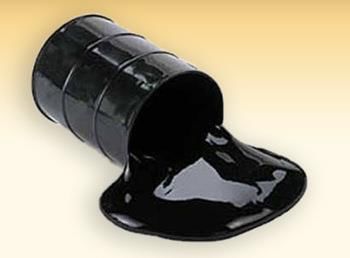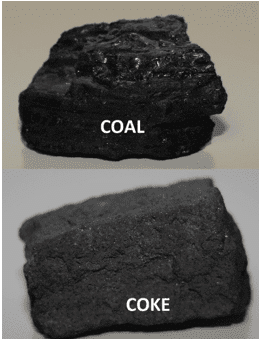NCERT Solutions for Class 8 Science Chapter 3 - Coal and Petroleum
Exercises
Q1. What are the advantages of using CNG and LPG as fuels?
Ans: Following are the advantages of using CNG and LPG as fuels:
(a) They are more efficient
(b) They can be easily transported; either in cylinders or through pipelines
(c) They are less polluting than other fossil fuels
Q2. Name the petroleum product used for surfacing of roads.
Ans: Bitumen Liquid bitumen.
Liquid bitumen.
Q3. Describe how coal is formed from dead vegetation. What is this process called?
Ans: Dead remains of plants got buried under the earth millions of years ago. Due to intense heat and pressure inside the earth they got converted into coal. The process of conversion of dead remains of plants into coal is called carbonization.
Formation of Coal
Q4. Fill in the blanks:
(a) Fossil fuels are …………, ………… and ……………..
Ans: Coal, Petroleum and Natural gas
(b) Process of separation of different constituents from petroleum is called ……………..
Ans: Refining
(c) Least polluting fuel for vehicle is ………………
Ans: CNG
Q5. Tick True/False against the following statements:
(a) Fossil fuels can be made in the laboratory.
Ans: False
(b) CNG is more polluting fuel than petrol.
Ans: False
(c) Coke is almost pure form of carbon.
Ans: True
(d) Coal tar is a mixture of various substances.
Ans: True
(e) Kerosene is not a fossil fuel.
Ans: False
Q6. Explain why fossil fuels are exhaustible natural resources.
Ans:
- Fossil fuels are made from the remains of ancient plants and animals that lived millions of years ago. Over these millions of years, heat and pressure from the Earth's crust turned these remains into coal, oil, and natural gas. This process is extremely slow and can take millions of years to complete.
- However, humans are using fossil fuels much faster than they can be naturally produced. We use them for many things, like driving cars, generating electricity, and heating our homes. Because we are burning these fuels so quickly and the Earth cannot replace them as fast as we use them, the amount of fossil fuels available is steadily decreasing.
Q7. Describe characteristics and uses of coke.
Ans: The following are the characteristics of coke:
- It is the almost purest form of carbon.
- It is black, porous, and tough as a substance.
- When coke is burnt, there is no smoke produced.
- To obtain coke, the coal is burnt in the absence of air.
The following are the uses of coke:
- It is used as a fuel.
- It is used in the extraction of different metals.
- It is used in the manufacturing of steel.

Q8. Explain the process of formation of petroleum.
Ans: The organisms which lived in the sea got buried at the bottom of oceans. Over a period of time, their dead bodies were covered with sediments. Intense pressure and heat under the earth’s layers transformed these organisms into petroleum.
Petrol formation.
Q9. The following Table shows the total power shortage in India from 1991– 1997. Show the data in the form of a graph. Plot shortage percentage for the years on the Y-axis and the year on the X-axis.
Ans:
|
136 videos|530 docs|57 tests
|
FAQs on NCERT Solutions for Class 8 Science Chapter 3 - Coal and Petroleum
| 1. What are the different types of coal? |  |
| 2. How is coal formed? |  |
| 3. What are the advantages of using coal as a source of energy? |  |
| 4. How is coal mined? |  |
| 5. What are the environmental impacts of burning coal? |  |






















